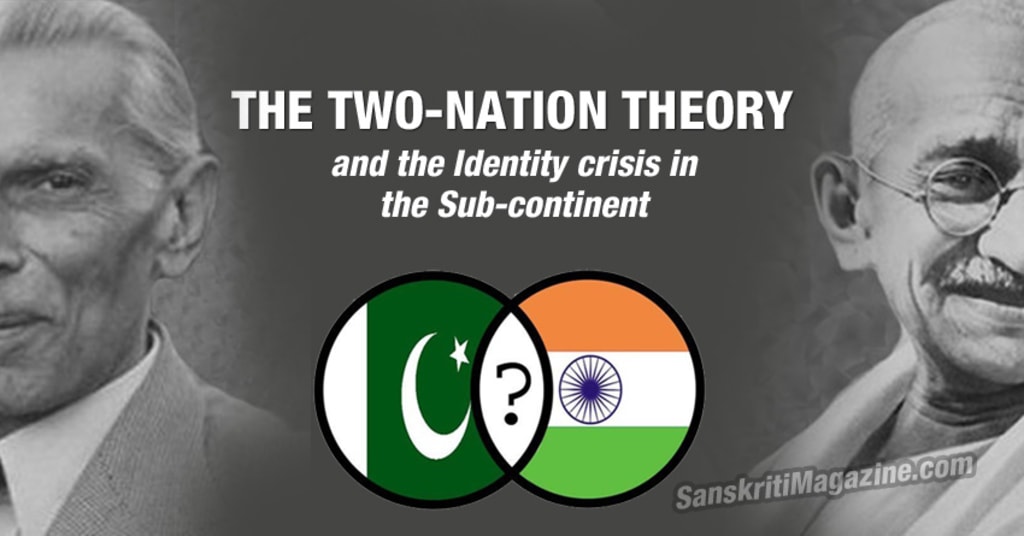Two nations theory
The ideological differences

The Two Nations Theory is a political theory that emerged in the 19th century to explain and justify the idea of the partition of India. According to this theory, India is not a single nation, but rather two distinct nations, Hindu and Muslim, that have always been in conflict with each other.
The theory was first proposed by Sir Syed Ahmed Khan, a renowned Muslim thinker, in the 19th century. He argued that Muslims and Hindus constituted two distinct nations and that the two could not coexist under a single government. He believed that Muslims could not expect justice and equality in a Hindu-dominated India and suggested that Muslims should have a separate political identity.
During the Indian independence movement, the Two Nations Theory gained more traction with the rise of the All India Muslim League (AIML) under the leadership of Muhammad Ali Jinnah, who would later become the first Governor-General of Pakistan. The AIML argued that Muslims in India were a separate nation and demanded a separate state for themselves.
In his famous 1940 Lahore Resolution, Jinnah declared that "Muslims are a nation by any definition of the word and must have their homeland, their territory, and their state." This led to the creation of Pakistan in 1947, which was intended to be a separate Muslim state distinct from India.
The Two Nations Theory is based on religious and cultural differences between Hindus and Muslims. Muslims have a separate culture and language, and their religion is distinct from Hinduism. The theory argues that the differences between the two groups are so significant that they cannot coexist peacefully in a single nation.
The theory also draws on the historical conflict between the two religious communities. The partition of India in 1947 was marred by widespread violence and displacement as Hindus and Muslims attacked each other. Advocates of the Two Nations Theory argue that this conflict was inevitable because of the fundamental differences between the two groups.
Critics of the Two Nations Theory argue that it is a simplistic and reductionist view of India's complex history and culture. They argue that the theory is based on stereotypes and exaggerates the differences between Hindus and Muslims, ignoring the rich history of cultural and religious exchange that has taken place between the two communities.
Moreover, the theory is criticized for its reliance on religion as the sole criterion for defining nations. Critics argue that nations are defined by more than just religion and that the Two Nations Theory ignores other significant factors such as language, ethnicity, and culture.
In conclusion, while the Two Nations Theory has played a significant role in shaping the politics of the Indian subcontinent, it remains a controversial and contested theory. While it has its supporters, critics argue that it is an oversimplified explanation of India's complex history and culture that relies too heavily on religious differences.
The Two-Nation Theory, a concept developed by Muslim leader Sir Syed Ahmad Khan and later popularized by Muhammad Ali Jinnah, sought to argue that Hindus and Muslims were separate nations with distinct identities, cultures, and interests that could not be accommodated within a single country. The theory culminated in the creation of Pakistan in 1947, but it remains a source of controversy and debate to this day. Supporters of the theory argue that it was necessary to safeguard the rights of the Muslim minority in India, which faced discrimination and marginalization under Hindu-majority rule. Critics, on the other hand, argue that the theory was divisive and led to the partition of India, which resulted in enormous bloodshed and displacement. Despite its mixed legacy, the Two-Nation Theory continues to play a significant role in the political discourse of South Asia, shaping debates about citizenship, nationalism, and communal harmony.
About the Creator
Muhammad Farman
..Hey. I'm Muhammad Farman and I upload my ideas on vocal media my ideas are based on stories, biography, Health diseases, education
Enjoyed the story? Support the Creator.
Subscribe for free to receive all their stories in your feed. You could also pledge your support or give them a one-off tip, letting them know you appreciate their work.






Comments
There are no comments for this story
Be the first to respond and start the conversation.